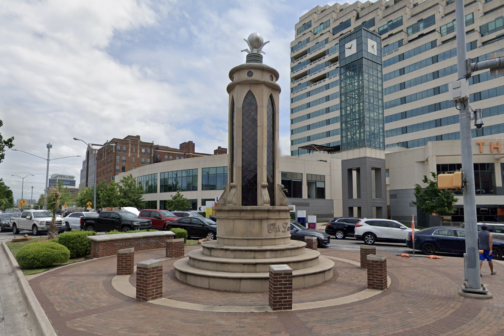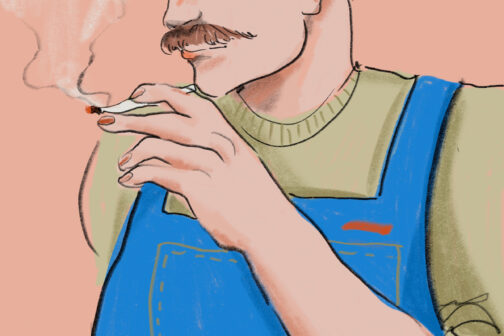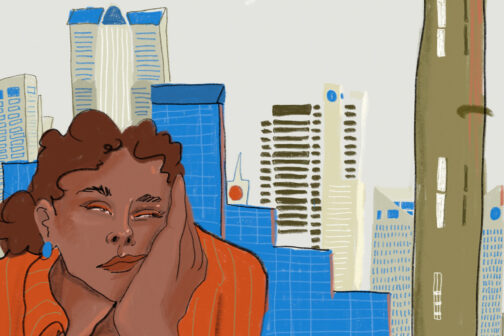From July 2019

The day after granddad died, I woke to a weedeater chewing up the front yard. I’d lived for the last decade, since I was 2, with my grandparents in East Dallas on Arturo Drive, a strip of chalk road that dead-ends with the Fraternal Order of Eagles lodge. They were the only mother and father I’d ever known, and in that time one person had worked the weedeater, and he was dead and gone. I knew Granny wouldn’t dare mess up her hive, gassed with hairspray, doing yardwork. Not in a million years. My eyes had been sealed shut with sleep and snot from crying so hard, but an investigation was needed.
The curtains in my room were made from swatches of an old bedspread with MLB logos halved and sewn back together, the fabric so thin from a thousand washes that the sun pushed through, the bedroom aglow at first light and bathed with the liquid blueness of summer. I pulled the curtains apart and saw Granny tangled in an orange extension cord center-lawn using the weedeater as a scythe, moving back and forth over the crabgrass, spitting dirt and pebbles and whole blades of grass airborne. She was after the loam, trying to scalp every inch of grass.
Granny’s cigarette burned against the early rising sun over the short-leaf pines. Across the way: Mrs. Derricks’ face pressed to her living room window; she held a tumbler of gin under her chin. It was early to be weedeating and an odder sight still to behold Granny stirring the small collection of single wides that had been backed in and unhitched years ago. Not a quarter mile away rails shifted above tar-black crossties as a train edged the lawyered estates of Forest Hills, their lawns pushpinned with private-school spirit signs and Teslas parked at showroom angles.
On the lawn, Granny cried through the cigarette in her mouth, lips accordioned around the filter, her slight shoulders bouncing with grief, shoulder blades cutting through her thin tank. I could see that the rest of her life—our life—was unknowable without Granddad. The Schwan’s man had been by just yesterday and brought a cloud of white chalk behind his truck. He offloaded a freezer full of chicken cordon bleu, tubs of sherbet, and every manner of frozen dinner that were staples for us.
Granny had defrosted and baked the cordon bleus, and not an hour after dinner Granddad lurched forward from his recliner and was dead by the time his reading glasses hit the shag in the living room—all 64 years of him; a solid man with roped veins; strong, machine shop hands splayed out at his sides; his eyes rolled up and staring blankly at the line of mesh-backed Vietnam Vet hats he wore out to Saturday breakfast to meet other old-timers at Barbec’s.
Outside, I shouted at Granny, but she couldn’t hear me over the whine and rattle of the weedeater, and I wouldn’t dare spook her, tap on her shoulder, with the extension cord coiled around her ankles. I watched Granny from the porch and squinted through a ball of gnats making atomic circles around my head.
Granny let the tobacco burn to the filter, let it drop from her mouth, then raised the weedeater straight as a rod over her head and throttled it, letting the twine spin until her house slippers tiptoed off the lawn, and then she was fully hovering with the weedeater helicoptering above her. I thought of Mary Poppins, of her umbrella, of her diagonal rise into London fog. And up Granny went, as far as she could go tethered to the cord, rising above the short-leaf pines until the extension cord fell away and slithered in orange free fall until it was back on the lawn and coiled as if Granddad had wound it around his palm and elbow and set it on the ground with purpose and care, the way he lived life.
I visored my palm until Granny was out of sight, her own diagonal rise into the haze of an early summer morning in Dallas, when the light pulses and fuzzes the vision, until its intensity and everything about the day bids you to look away. But I couldn’t look away: Granny rising over the utility easement with latticed transmission towers and overhead power lines. I imagined her sailing over White Rock Lake, a shock of Arboretum color below her, and up into the blue-white sky. I stood there waiting for Granny to return, and as I did, morning turned into day, into night, into a lifetime, until this very today. And here I stand still, an old man rheumy with cataracts, skin thin with sunspots, bones porous and avian, slight and hidden in blades of grass up to my shoulders.






